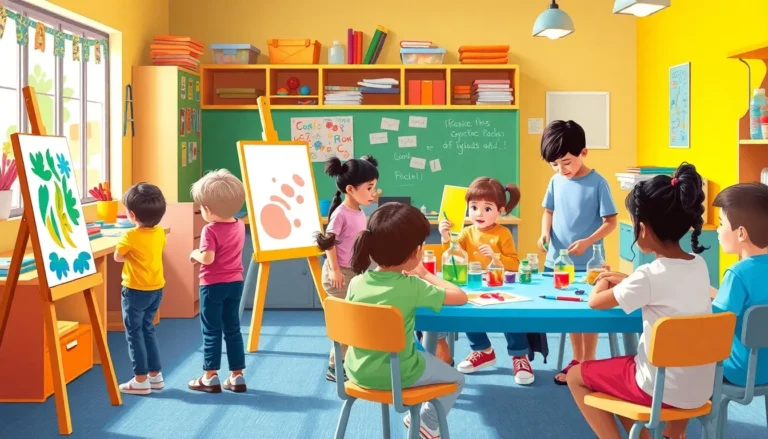In a world where parenting often feels like a chaotic circus, modern parents need more than just a strong cup of coffee to survive. With technology changing the game and kids’ expectations skyrocketing, navigating this wild ride can be a challenge. But fear not! There’s a treasure trove of tips that can transform even the most frazzled parent into a confident superhero.
Table of Contents
ToggleUnderstanding Modern Parenting
Modern parenting faces unique challenges, influenced by technology and changing societal expectations. Parents must navigate these complexities while shaping their children’s futures.
The Evolution of Parenthood
Parenting evolves continuously, reflecting changes in culture and society. Historically, parents relied on tradition and community support for guidance. Today, rapid technological advancements create both opportunities and challenges. Access to information allows parents to make informed decisions. They also face pressure to adapt to new parenting theories and practices, often leading to confusion.
Key Differences in Modern Parenting Styles
Diverse parenting styles characterize the modern landscape. Many parents emphasize open communication, fostering emotional intelligence in children. Traditional authoritarian methods give way to approaches that prioritize collaboration and respect. Additionally, technology integration plays a significant role. Many parents use educational apps and resources to support learning. Flexible work arrangements challenge old norms, giving parents more time to spend with their children. These differences highlight the shift toward a more balanced and supportive parenting paradigm.
Balancing Technology and Parenting

Navigating technology and parenting presents unique challenges. Parents today must find effective strategies to integrate technology while fostering healthy habits in their children.
Setting Screen Time Boundaries
Establishing screen time boundaries helps children learn moderation. Guidelines suggest limiting screen time to two hours for recreational use each day. Consistent schedules can reinforce these limits, ensuring kids understand when it’s time to engage in other activities. Many parents find success by creating tech-free zones, such as during mealtimes or in bedrooms. These strategies promote face-to-face interactions and reduce distractions. Furthermore, involving children in discussions about screen time can encourage accountability. Parents should regularly evaluate their family’s screen time practices, adjusting as needed to reflect changing circumstances and the child’s needs.
Encouraging Healthy Digital Habits
Promoting healthy digital habits equips children to navigate technology responsibly. Parents can model good behavior by prioritizing real-life interactions over devices. Setting a positive example fosters an understanding of balanced technology use. Teaching children about internet safety is crucial; instructions on recognizing online risks create awareness. Engaging children in creating digital content can enhance their creativity and understanding of technology’s potential. Additionally, families can explore educational apps together, reinforcing the idea that technology can be a tool for learning. Encouraging breaks from screen time supports mental health and well-being. Lastly, regular discussions about online behavior and ethics guide children in making informed choices.
Fostering Emotional Intelligence
Fostering emotional intelligence is crucial in modern parenting. It equips children with skills for understanding their emotions and those of others.
Techniques for Active Listening
Active listening techniques enable parents to engage meaningfully with their children. Parents should maintain eye contact, showing that they value their child’s words. Reflecting back feelings encourages children to express themselves more openly. Asking clarifying questions reveals deeper understanding and empathy. Providing feedback demonstrates attentiveness, making conversations more effective. Additionally, validating emotions helps children feel heard and respected.
Promoting Empathy in Children
Promoting empathy in children helps them develop essential social skills. Reading diverse stories exposes children to various perspectives, building understanding. Encouraging discussions about feelings allows children to relate to others’ experiences. Modeling empathetic behaviors fosters a supportive environment. Volunteering together cultivates compassion and kindness, reinforcing the importance of helping others. Using role-playing exercises enhances children’s ability to see situations from different viewpoints.
Embracing Diversity and Inclusion
Modern parenting involves nurturing an inclusive mindset in children. Understanding and celebrating differences foster empathy and compassion.
Teaching Children About Differences
Expose children to various cultures, lifestyles, and backgrounds through books, movies, and diverse activities. Direct interaction with peers from different backgrounds also enhances their awareness. Engage in discussions about these differences, focusing on shared values and experiences. For example, visiting cultural festivals can enrich understanding and appreciation. Provide opportunities for children to ask questions, encouraging curiosity. Children learn to respect diversity when parents model inclusive behaviors and attitudes.
Encouraging Open Conversations
Create a safe space for children to express their thoughts and feelings. Open dialogues about diversity can be initiated during family meals or car rides. When parents ask open-ended questions, children feel more comfortable sharing. For instance, discussing current events can lead to impactful conversations about inclusion and discrimination. Validate feelings and perspectives, ensuring children know their voices matter. Consistency in these discussions empowers children to embrace diversity and advocate for inclusivity in their communities.
Building a Supportive Community
Creating a supportive community is vital for modern parents. Connections with other parents offer shared experiences and valuable insights.
The Importance of Networking with Other Parents
Networking with other parents fosters a sense of belonging. Many parents find comfort in sharing challenges and solutions. Groups, whether in person or online, provide a platform for exchanging ideas about parenting strategies. Engagement in local activities, like school events or sports, opens doors to building friendships. Collaborating with other parents can lead to valuable support systems. Many parents discover that sharing resources, such as babysitters or educational materials, creates a more manageable parenting experience.
Utilizing Online Resources and Forums
Online resources and forums serve as valuable tools for parents seeking guidance. Platforms designed specifically for parents offer insights on various topics, from child development to health advice. Many parents benefit from participating in discussions where they can ask questions and share experiences. Engaging with these digital communities allows for networking beyond local boundaries. Websites and social media groups often host experts who provide tips and answer inquiries, making information readily accessible. By connecting with others, parents gain diverse perspectives that enhance their parenting journey.
Navigating modern parenting requires adaptability and a willingness to embrace change. By implementing effective strategies and fostering open communication, parents can create a nurturing environment that supports their children’s growth.
Encouraging emotional intelligence and empathy equips kids with essential life skills, while setting healthy boundaries around technology promotes balanced lifestyles. Building a supportive community further enriches the parenting experience, offering valuable insights and shared solutions.
As parents continue to evolve alongside their children, they can confidently tackle the challenges of today’s fast-paced world, ensuring a positive and enriching upbringing for the next generation.



